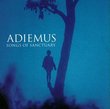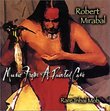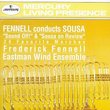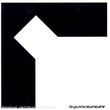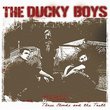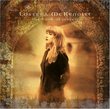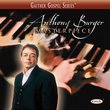| All Artists: Academy of Ancient Music, Richard Egarr Title: Bach: Brandenburg Concertos nos. 1 - 6 Members Wishing: 0 Total Copies: 0 Label: Harmonia Mundi Original Release Date: 1/1/2009 Re-Release Date: 3/10/2009 Album Type: Hybrid SACD - DSD, Import Genre: Classical Styles: Forms & Genres, Concertos, Symphonies Number of Discs: 2 SwapaCD Credits: 2 UPC: 093046746162 |
Search - Academy of Ancient Music, Richard Egarr :: Bach: Brandenburg Concertos nos. 1 - 6
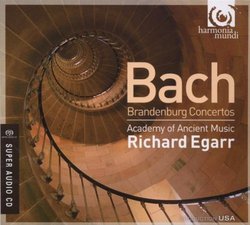 | Academy of Ancient Music, Richard Egarr Bach: Brandenburg Concertos nos. 1 - 6 Genre: Classical
Long neglected on library shelf in Brandenburg Castle, these six 'Concertos for several instruments' have since become some of the best-known works in the classical repertoire for their musical inventiveness and their game... more » |
Larger Image |
CD DetailsSynopsis
Product Description Long neglected on library shelf in Brandenburg Castle, these six 'Concertos for several instruments' have since become some of the best-known works in the classical repertoire for their musical inventiveness and their games of mathematical symmetry. Richard Egarr and teh Academy of Ancient Music have endeavoured to return to the original 'chamber' conception of the works, with one instrument per part. Similarly Requested CDs
|
CD ReviewsEven if you already own any other Brandenburg recording, thi Randall Wilkens | Mount Vernon, WA United States | 03/25/2009 (5 out of 5 stars) "We had the opportunity to hear the Academy of Ancient Music with Richard Egarr perform these pieces on their recent North American tour. It was the finest concert I've ever had the pleasure of hearing. The concertos came alive in a way one never expects even in the finest professional performances. The interpretations were fresh, exciting, musical, and dramatic--yet not at the expense of historic performance principles or a thorough understanding of Bach's style and character. The uniqueness of every concerto--each with its own colorful instrumentation--stood out as if for the first time. The performers were obviously enjoying themselves and actually having a lot of fun with these great pieces of music. I found myself laughing with delight and singing along internally as each successive movement was performed. I ordered this CD set immediately, but in the intervening week before it arrived I wondered whether the qualities I had experienced in the live performance would be captured on the recording. Far from being disappointed, I have been thrilled to discover these performances again as if for the first time. The pastoral cheekiness of the horns in the first concerto, the relaxed precision of the four soloists in the second concerto, the spun artistry of the third concerto, Roldofo Richter's astounding technique and musicianship on the fourth concerto, Richard Egarr's own disarming interpretation of the harpsichord solos on the fifth concerto (his rather significant degree of tempo flexibility is still growing on me!), and the surprising brilliance of the violin-deprived sixth concerto--they are all here to enjoy and enjoy again. Even if you already own one or several of the many recordings available of the Brandenburg Concertos, I highly recommend that you add this one to your collection. You will hear these pieces in a new way each time you listen." Gently wins the race J. F. Laurson | Washington, DC United States | 05/13/2009 (5 out of 5 stars) "[?] In Egarr's recording I particularly love the silken airiness of the Second Concerto's Allegro and the--musicologically incorrect--use of theorbo basso continuo throughout the Adagio ma non tanto of the Sixth Concerto. To quote Egarr, who readily admits there being no historical context for either theorbo or guitar (employed in the Fifth Concerto), the added continuo color was "a delicious luxury which [he] couldn't forgo." From his previous recordings, I've never found Richard Egarr to be a man of extremes, and he performs these works with a well-judged moderation, too. His Allegros are not quite so fast, his Adagios not overly slow, his accents lively but not spiked. His touch on the harpsichord is soft and ever-deft. He doesn't set out to shock (not even peripherally), or primarily excite, but to delight. This warm touch reminds of Jordi Savall's version with Le Concert des Nations more than any other HIP account I know. The sound is excellent: rich and with lots of room to bloom--although on the soft side, further emphasizing the character of the interpretation. Voices are not as easily separable as in the Alessandrini recording, which offers more clarity. The presentation of the SACD Surround capable recording is up to Harmonia Mundi's usual high standards, the liner notes by Richard Egarr (in English, French, German) eminently worth reading, and information on all the musicians and the instruments they use is given in well chosen and readable fonts. The continued improvements in the skill of playing original instruments are still notable. I used to think that Pinnock's English Concert recording was about as good as it gets - a notion I was disabused of by many subsequent groups bettering that laudable effort. Egarr won't be the last word in this progression, either, but the increments are getting smaller and smaller. No doubt related to the general mellowness of this version, I find it a small but decided improvement even over Pinnock/Avie. Favorite HIP versions are the Academy for Ancient Music Berlin (HMU) and Savall (Naïve); Egarr joins them. Is this a must-have for anyone who already enjoys one or two HIP Brandenburgs in their collection? Of course not. Will you want to add it, anyway? You bet. " Good, but there's a better option Virginia Opera Fan | Falls Church, VA USA | 06/26/2009 (4 out of 5 stars) "If this set had come along a few years ago, it would have been my first choice for the Brandenburgs in SACD sound. As it is, it competes with I Barocchisti/Fasolis on ARTS 46615-8 and 47716-8. Egarr and the Academy offer us very nicely executed, proper "English" Bach - with everything nicely in place. Unfortunately, in a concerto by concerto comparison, the English ensemble is bested by the Italians' sense of sheer joy in the music. Both are equally well played. Francesco Cera, the harpsichordist in the ARTS set, is becoming one of my favorite artists.
The sound in this Harmonia Mundi production is wonderfully smooth, detailed and lush. Although these are one player to a part performances, the recorded sound is anything but spare. As an earlier reviewer noted, the timing is a little short. (ARTS includes the A Minor Triple Concerto as a bonus.) I have a number of "historically informed" Brandenburg sets, going back to Harnoncourt's early effort on Telefunken/Teldec. They include the Berlin Akademie, Goebel, Goodman, Hogwood, Koopman, Kuijken, Leonhardt, Orchestra of the Age of Enlightenment, Pickett, and Pinnock (I) in addition to the two mentioned here. (OK, I'm nuts.) I'm certainly keeping Mr. Egarr and the Academy, but Fasolis and his band come off the shelves most often." |

 Track Listings (9) - Disc #1
Track Listings (9) - Disc #1